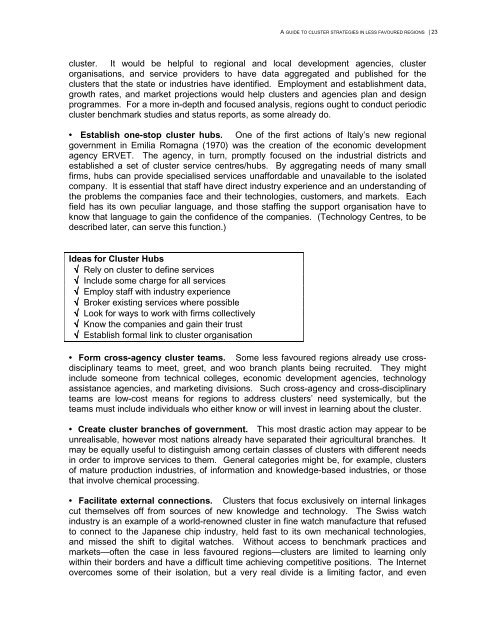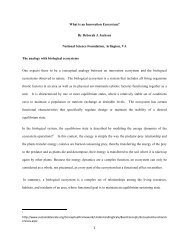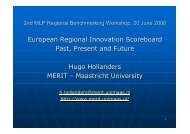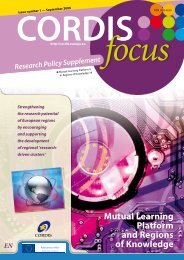Creating smart systems, guide to Cluster strategies in less favoured
Creating smart systems, guide to Cluster strategies in less favoured
Creating smart systems, guide to Cluster strategies in less favoured
You also want an ePaper? Increase the reach of your titles
YUMPU automatically turns print PDFs into web optimized ePapers that Google loves.
A GUIDE TO CLUSTER STRATEGIES IN LESS FAVOURED REGIONS | 23<br />
cluster. It would be helpful <strong>to</strong> regional and local development agencies, cluster<br />
organisations, and service providers <strong>to</strong> have data aggregated and published for the<br />
clusters that the state or <strong>in</strong>dustries have identified. Employment and establishment data,<br />
growth rates, and market projections would help clusters and agencies plan and design<br />
programmes. For a more <strong>in</strong>-depth and focused analysis, regions ought <strong>to</strong> conduct periodic<br />
cluster benchmark studies and status reports, as some already do.<br />
• Establish one-s<strong>to</strong>p cluster hubs. One of the first actions of Italy’s new regional<br />
government <strong>in</strong> Emilia Romagna (1970) was the creation of the economic development<br />
agency ERVET. The agency, <strong>in</strong> turn, promptly focused on the <strong>in</strong>dustrial districts and<br />
established a set of cluster service centres/hubs. By aggregat<strong>in</strong>g needs of many small<br />
firms, hubs can provide specialised services unaffordable and unavailable <strong>to</strong> the isolated<br />
company. It is essential that staff have direct <strong>in</strong>dustry experience and an understand<strong>in</strong>g of<br />
the problems the companies face and their technologies, cus<strong>to</strong>mers, and markets. Each<br />
field has its own peculiar language, and those staff<strong>in</strong>g the support organisation have <strong>to</strong><br />
know that language <strong>to</strong> ga<strong>in</strong> the confidence of the companies. (Technology Centres, <strong>to</strong> be<br />
described later, can serve this function.)<br />
Ideas for <strong>Cluster</strong> Hubs<br />
√ Rely on cluster <strong>to</strong> def<strong>in</strong>e services<br />
√ Include some charge for all services<br />
√ Employ staff with <strong>in</strong>dustry experience<br />
√ Broker exist<strong>in</strong>g services where possible<br />
√ Look for ways <strong>to</strong> work with firms collectively<br />
√ Know the companies and ga<strong>in</strong> their trust<br />
√ Establish formal l<strong>in</strong>k <strong>to</strong> cluster organisation<br />
• Form cross-agency cluster teams. Some <strong>less</strong> <strong>favoured</strong> regions already use crossdiscipl<strong>in</strong>ary<br />
teams <strong>to</strong> meet, greet, and woo branch plants be<strong>in</strong>g recruited. They might<br />
<strong>in</strong>clude someone from technical colleges, economic development agencies, technology<br />
assistance agencies, and market<strong>in</strong>g divisions. Such cross-agency and cross-discipl<strong>in</strong>ary<br />
teams are low-cost means for regions <strong>to</strong> address clusters’ need systemically, but the<br />
teams must <strong>in</strong>clude <strong>in</strong>dividuals who either know or will <strong>in</strong>vest <strong>in</strong> learn<strong>in</strong>g about the cluster.<br />
• Create cluster branches of government. This most drastic action may appear <strong>to</strong> be<br />
unrealisable, however most nations already have separated their agricultural branches. It<br />
may be equally useful <strong>to</strong> dist<strong>in</strong>guish among certa<strong>in</strong> classes of clusters with different needs<br />
<strong>in</strong> order <strong>to</strong> improve services <strong>to</strong> them. General categories might be, for example, clusters<br />
of mature production <strong>in</strong>dustries, of <strong>in</strong>formation and knowledge-based <strong>in</strong>dustries, or those<br />
that <strong>in</strong>volve chemical process<strong>in</strong>g.<br />
• Facilitate external connections. <strong>Cluster</strong>s that focus exclusively on <strong>in</strong>ternal l<strong>in</strong>kages<br />
cut themselves off from sources of new knowledge and technology. The Swiss watch<br />
<strong>in</strong>dustry is an example of a world-renowned cluster <strong>in</strong> f<strong>in</strong>e watch manufacture that refused<br />
<strong>to</strong> connect <strong>to</strong> the Japanese chip <strong>in</strong>dustry, held fast <strong>to</strong> its own mechanical technologies,<br />
and missed the shift <strong>to</strong> digital watches. Without access <strong>to</strong> benchmark practices and<br />
markets—often the case <strong>in</strong> <strong>less</strong> <strong>favoured</strong> regions—clusters are limited <strong>to</strong> learn<strong>in</strong>g only<br />
with<strong>in</strong> their borders and have a difficult time achiev<strong>in</strong>g competitive positions. The Internet<br />
overcomes some of their isolation, but a very real divide is a limit<strong>in</strong>g fac<strong>to</strong>r, and even
















